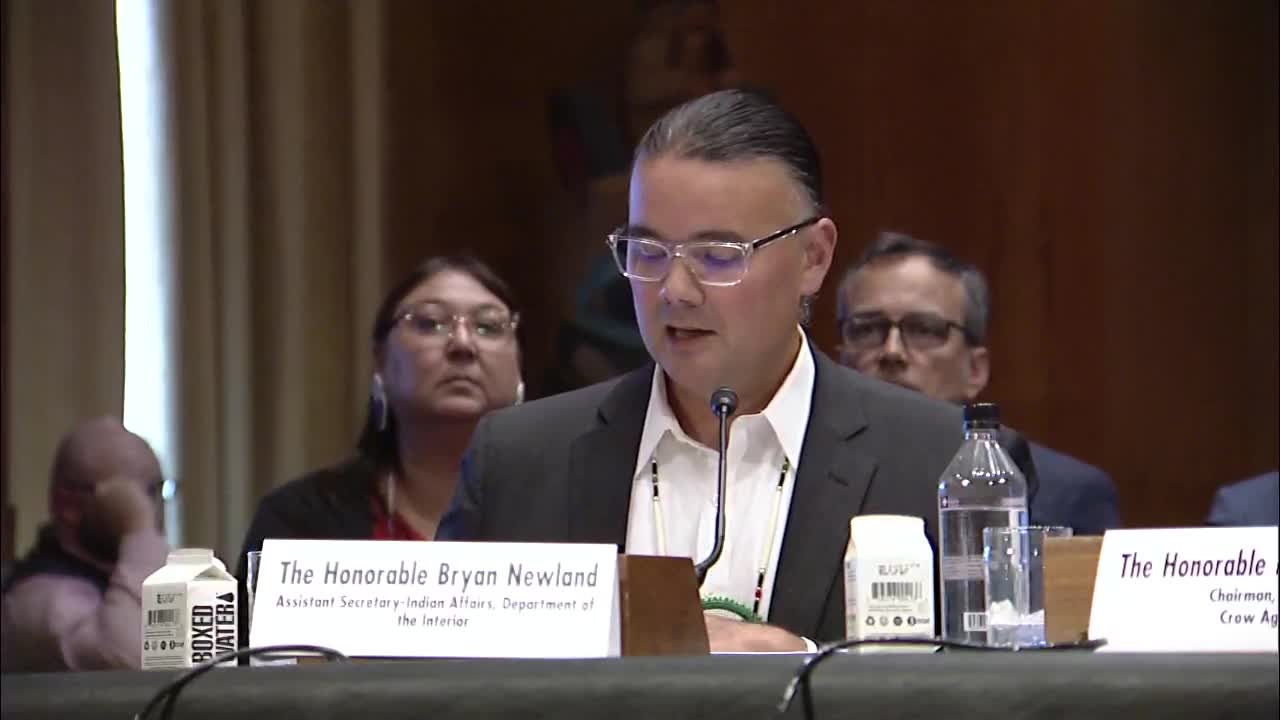Crow Tribe Seeks Economic Revival Through Landmark Land Exchange
September 25, 2024 | Senate Committee on Indian Affairs, Special, Select and Other Committees - House & Senate, Congressional Hearings Compilation
This article was created by AI summarizing key points discussed. AI makes mistakes, so for full details and context, please refer to the video of the full meeting. Please report any errors so we can fix them. Report an error »

In a recent government meeting, significant discussions centered around several key pieces of legislation aimed at addressing tribal rights, water infrastructure, and land management issues.
The Department of the Interior expressed support for multiple bills, including S 4705, which proposes a land exchange with the Forest Service to benefit the Bridal Verde reservation. The department acknowledged the need for further discussions regarding the project's cost and scope.
Another critical piece of legislation, S 4998, aims to settle all tribal rights in the Rio San Jose basin, providing stability for water users in the area. This bill would also allocate funding for the Navajo Nation to develop water infrastructure to meet both current and future needs.
The Zuni Indian Tribe Water Rate Settlement Act, S 4643, was highlighted as a resolution to decades of litigation, allowing the Zuni tribe to manage trust funds for their water needs autonomously. This approach empowers the tribe to make decisions about their water infrastructure without being tied to specific federal mandates.
Additionally, S 4444, known as the Crow Revenue Act, was presented by Frank White Clay, Chairman of the Crow Nation. This legislation proposes a land exchange that would transfer approximately 4,660 acres of mineral estate to the Crow tribe, consolidating their ownership and enhancing their economic opportunities. The bill requires a revenue-sharing agreement between the Crow tribe and the Hope Family Trust for any future mineral development, which could provide a vital revenue stream for the tribe.
Chairman White Clay emphasized the importance of this legislation in addressing longstanding land management challenges and reaffirming the sovereignty of the Crow tribe. He noted that the bill mirrors successful past legislation for the Northern Cheyenne tribe and is crucial for the tribe's economic revitalization.
The discussions underscored a commitment to resolving historical grievances and enhancing the economic independence of tribal nations through legislative support. The meeting concluded with a call for continued collaboration to ensure the successful implementation of these initiatives.
The Department of the Interior expressed support for multiple bills, including S 4705, which proposes a land exchange with the Forest Service to benefit the Bridal Verde reservation. The department acknowledged the need for further discussions regarding the project's cost and scope.
Another critical piece of legislation, S 4998, aims to settle all tribal rights in the Rio San Jose basin, providing stability for water users in the area. This bill would also allocate funding for the Navajo Nation to develop water infrastructure to meet both current and future needs.
The Zuni Indian Tribe Water Rate Settlement Act, S 4643, was highlighted as a resolution to decades of litigation, allowing the Zuni tribe to manage trust funds for their water needs autonomously. This approach empowers the tribe to make decisions about their water infrastructure without being tied to specific federal mandates.
Additionally, S 4444, known as the Crow Revenue Act, was presented by Frank White Clay, Chairman of the Crow Nation. This legislation proposes a land exchange that would transfer approximately 4,660 acres of mineral estate to the Crow tribe, consolidating their ownership and enhancing their economic opportunities. The bill requires a revenue-sharing agreement between the Crow tribe and the Hope Family Trust for any future mineral development, which could provide a vital revenue stream for the tribe.
Chairman White Clay emphasized the importance of this legislation in addressing longstanding land management challenges and reaffirming the sovereignty of the Crow tribe. He noted that the bill mirrors successful past legislation for the Northern Cheyenne tribe and is crucial for the tribe's economic revitalization.
The discussions underscored a commitment to resolving historical grievances and enhancing the economic independence of tribal nations through legislative support. The meeting concluded with a call for continued collaboration to ensure the successful implementation of these initiatives.
View full meeting
This article is based on a recent meeting—watch the full video and explore the complete transcript for deeper insights into the discussion.
View full meeting